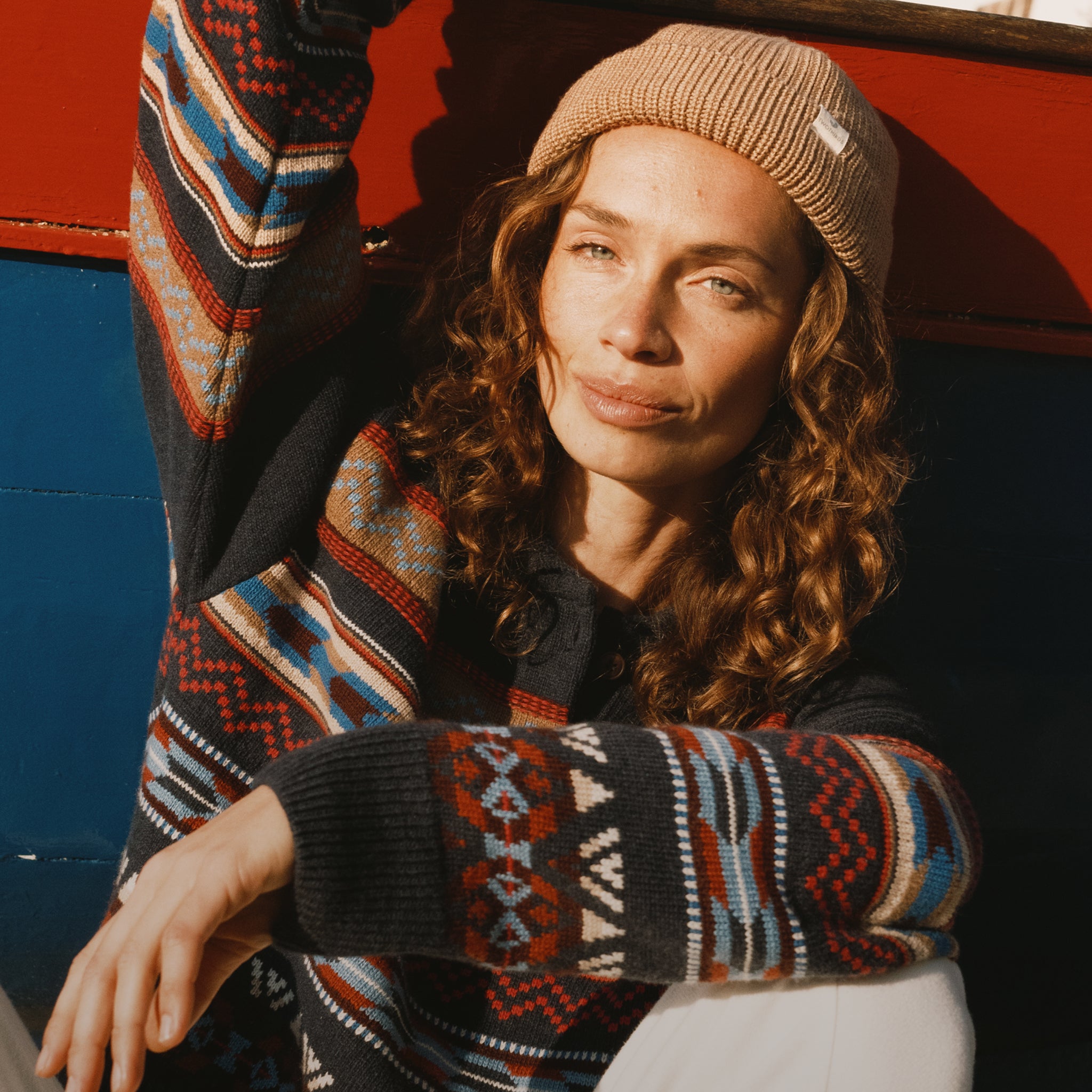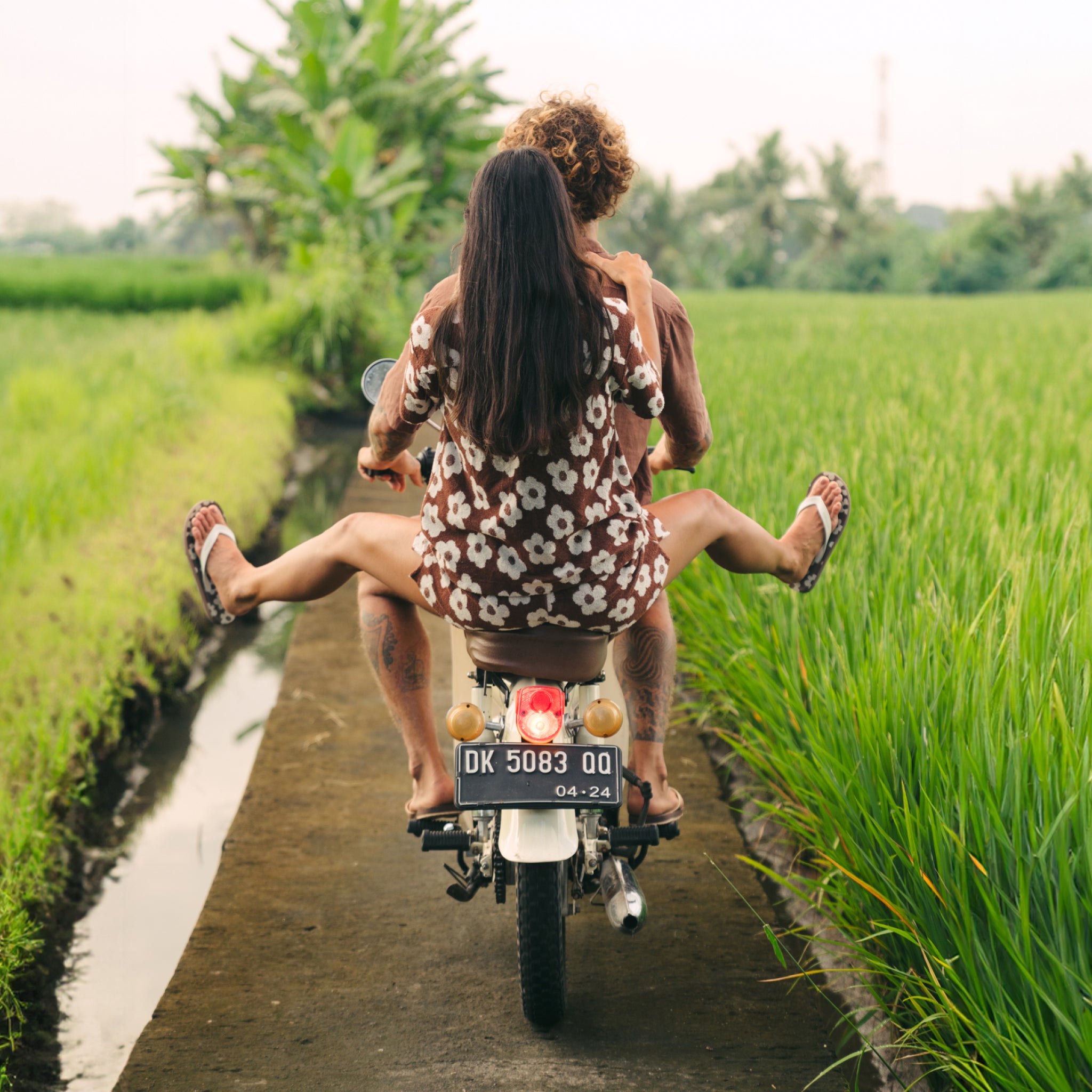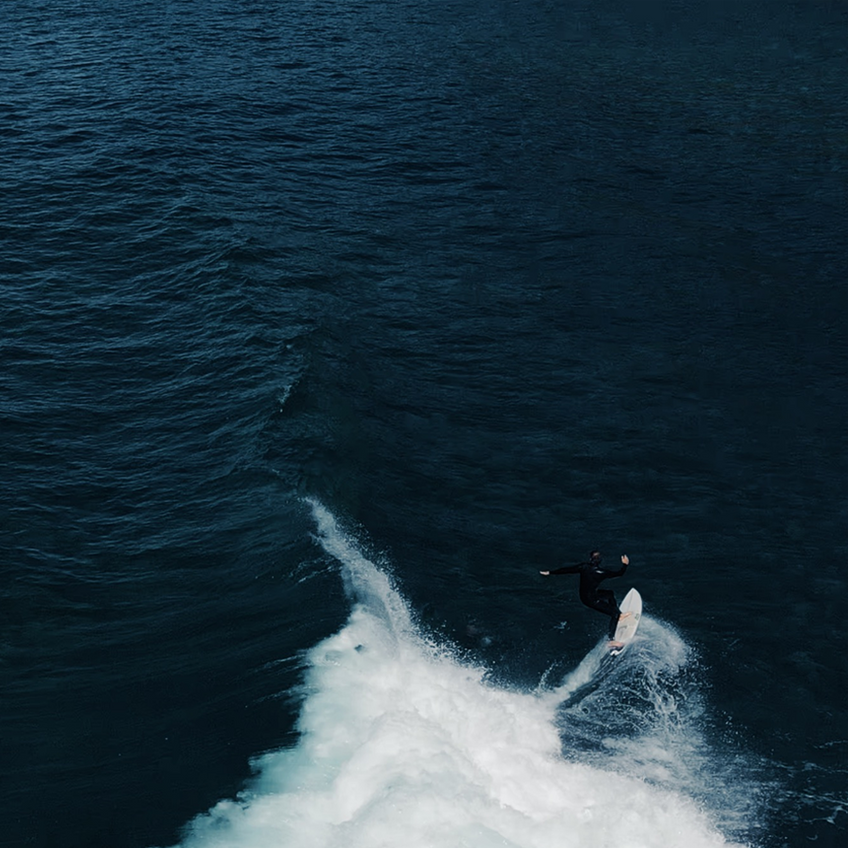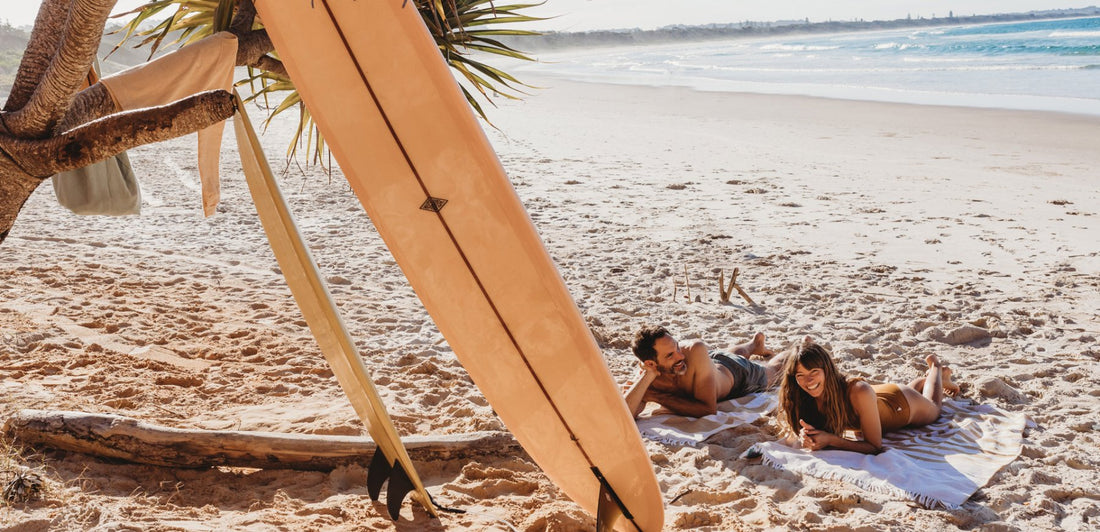We first reached out to Courtney and Michael 5 years ago, when they were travelling through Australia - where they later settled with their family. Our brand was young and bright-eyed, and they were kind enough to try out a line of children’s clothing that we had produced. Happily, we’ve stayed in touch ever since, becoming friends in spite of the distance.
It has been a joy to watch them create their own sustainable lifestyle from scratch, as they became part of the unique Byron Bay community. So we thought it was about time you got to know them too!
It’s clear from the shoot that you like to pack a lot into a single day! Is there a particular moment in your routine that you really treasure?
Well, like most people we treasure our morning coffee. We have a daily ritual of cleaning the Bialetti coffee maker, manually grinding the beans, putting it on the stove and then frothing the milk. So there’s 15 minutes or so of effort and anticipation before we finally have the sweet reward. This time of year (winter down here) we also make hot porridge every morning topped with fruit, nuts and kefir. So, I guess that’s a long winded way to say we really look forward to our breakfast routine!





When did you first discover surfing? Has it changed your life?
We fell in love with surfing in 2015 when we set off on a family gap year travelling the world with our kids. When we decided our itinerary the year before in London, surfing did not feature at all in our plans. However, when we arrived in Trancoso, Brazil early in the journey, our host recommended that we get our kids lessons with the local instructor, Romaldo.
We all soon fell for the sport. So much so that we changed our itinerary to accommodate more destinations with surf. It’s become a passion for everyone in our family, and for some of us an obsession. We will never look at the ocean (or any body of water really!) the same again.
What is wonderful about surfing, that is not the case with other sports, is that we can often do it as a family. Here in Byron Bay, there are several breaks where we can all be in the water at the same time. Michael can even put 4-year old Wilkie on his board with him. That experience of a shared passion, completely immersed and at the mercy of mother nature, is really life affirming for our family.
“There is a constant influx of ideas, energy, creativity and good vibes in Byron.”
What’s special about Byron Bay?
Beyond natural beauty, which Byron abounds in, it’s the community that makes Byron Bay special. It is often referred to as ’the bubble’ around here, because it is so unique from everywhere else nearby, and everywhere we’ve ever been. It’s a community full of really welcoming, like-minded people who prioritise time with family and friends, outdoors, with good food and so on. And because it attracts lots of visitors, both from here and afar, there is a constant influx of ideas, energy, creativity and good vibes in Byron that you just don’t find in many small, rural areas. Of course, it’s not perfect and it has its detractors, but we just love it here.

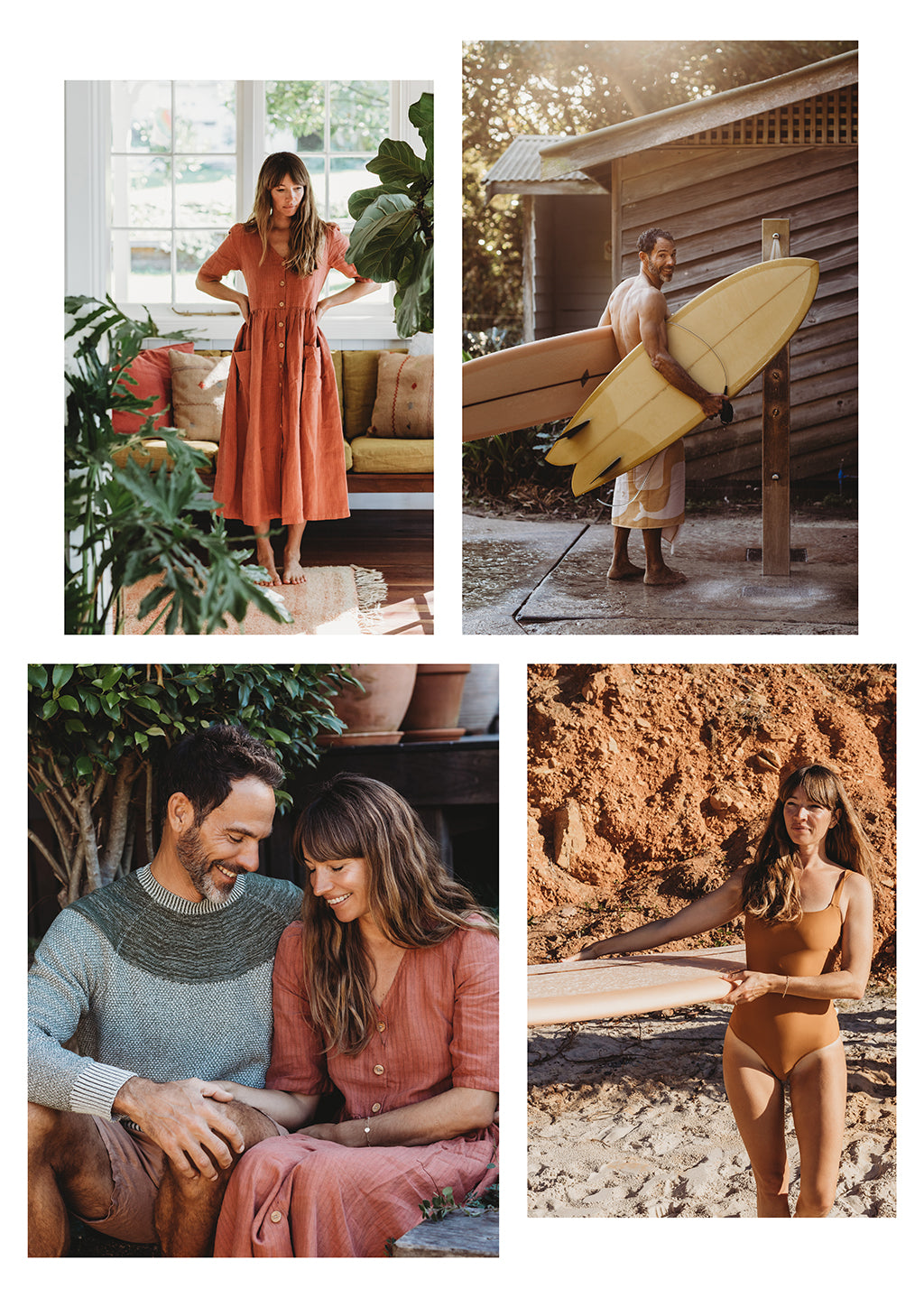


We heard that you have your own beehive! Why did you choose to set it up and is it challenging to maintain?
We do! It’s called a FlowHive and it was invented by a local Byron Bay beekeeper and his father. It’s a beautiful and clever way to keep bees with less disturbance to them and a bit less work for the beekeeper. It was pretty easy to set up and just requires monthly checks on the bees (in full beekeeper attire of course!). We are far from experts but we’re learning loads and looking forward to harvesting our first batch of honey later this year.
What steps have you taken to be more eco-friendly in general?
Well, there are quite a few but we have far to go. Probably the biggest step is that we eat a vegetarian diet. We do not cook meat at home or order it out, but we do occasionally eat local fish or seafood. We have also reduced our dairy intake. Beyond that, we have installed solar panels on our roof, bought an electric car, we recycle our food waste in a worm farm (check out the Subpod, another cool Byron Bay invention!), collect rainwater, grow lots of our regular ingredients (herbs, greens, chillies, ginger, etc.) and someday we will get lots of fruit from the dozens of fruit trees we’ve planted around our home.
(...)
We also give money to an amazing charity called Effective Altruism which helps target our giving to the causes we are most passionate about. Last year they identified the most effective charities fighting climate change and we donated to them.
“From our travels, we learned that there are many ways to live and be happy, and often it does not involve material wealth or the pursuit of more.”
Why do you think buying locally is so important?
Environmentally speaking, the more local the product, the lower its carbon footprint and the greater its sustainability. Of course, we could think of exceptions to this but it’s generally true. It’s also really good to know where your goods are coming from and the kind of companies or people your money is going to support.





What were some of the lessons you picked up on your trip around the world?
There were lots of lessons we learned from our travels, including how little we need to be happy, and how home is wherever our family is. We also met so many wonderful people around the world who were living a life that fulfilled them — a palm weaver in Brazil, a rancher in Uruguay, a surf instructor in Chile, a tuk tuk driver in Sri Lanka, a pastry chef in Italy, and many others. And what we learned from them is that there are many ways to live and be happy, and often it does not involve material wealth or the pursuit of more.
Do you feel that it’s easier to be sustainable in the countryside rather than a city like London?
I think it’s equally possible in either environment. London actually made sustainable living very accessible. For example, public transport, cycling and walking are much easier to access in London than in our current town, where we have to use our car everyday. London has lots of great farmers markets with local products and produce, and amazing parks for recreation. All of the boroughs had great recycling and waste programs. And we were fortunate to have a small garden in London too, which enabled us to grow a few basics and also to compost food and garden waste.

Finally, do you have any advice for families looking to follow in your footsteps and be more connected to nature?
It can be a difficult decision to take, but if your heart is telling you it's the right one, do it!
It took a long time to work up the courage to leave the comfortable life we had built in London for the dream of a less complicated life closer to nature, especially for Michael. It was a step into the unknown. So it was not easy to make that leap but we are SO thankful that we did. It has allowed us to spend so much more time together as a family, to opt out of the rat race and to get our work-life balance firmly in favour of life.
Do it. You will not regret it.





